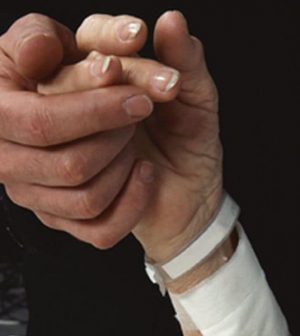- Could Your Grocery Store Meat Be Causing Recurring UTIs?
- Are You Making This Expensive Thermostat Error This Winter?
- Recognizing the Signs of Hypothyroidism
- 10 Strategies to Overcome Insomnia
- Could Artificial Sweeteners Be Aging the Brain Faster?
- Techniques for Soothing Your Nervous System
- Does the Water in Your House Smell Funny? Here’s Why
- Can a Daily Dose of Apple Cider Vinegar Actually Aid Weight Loss?
- 6 Health Beverages That Can Actually Spike Your Blood Sugar
- Treatment Options for Social Anxiety Disorder
Injured Parent Can Mean Sleepless Nights for Kids

Children face an increased risk for sleep problems if a parent suffers a serious injury, especially if the parent has a brain injury and post-traumatic stress disorder (PTSD), a new study reveals.
Researchers used U.S. Military Health System records to identify more than 485,000 children of more than 272,000 parents who were seriously injured in combat or daily life.
Common injuries among the parents were brain or battle injuries. The children in the study were up to 18 years old, with an average age of 7 years.
Overall, children were 17 percent more likely to have outpatient care for sleep disorders after a parent was injured. Teens had a 37 percent increase in visits to a sleep specialist after a parent’s injury.
Many teens already have sleep issues due to changing body clocks prompted by puberty and the challenges of high school, noted study author Dr. Saira Ahmed, a pediatrics resident at Walter Reed National Military Medical Center in Bethesda, Md.
Children of parents with both a brain injury and PTSD had a 48 percent increase in visits to a sleep specialist, according to the study. It’s scheduled for presentation this Sunday at the American Academy of Pediatrics national conference, in Orlando, Fla.
When a parent suffers a serious injury, it can alter a child’s daily routine and the child may witness their parent’s pain and recovery, Ahmed said in a meeting news release.
“It is imperative that medical providers discuss their children’s sleep with parents and consider sleep in the care plan of children of injured parents,” she said.
Until it’s published in a peer-reviewed journal, research presented at meetings should be viewed as preliminary.
More information
BrainLine offers advice on helping children cope with a head injury to a family member.
Source: HealthDay
Copyright © 2026 HealthDay. All rights reserved.










